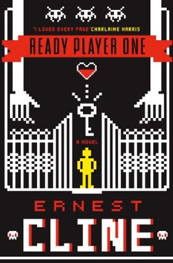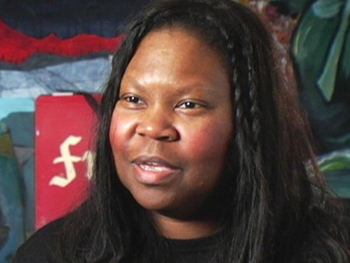|
|
|
 |
 |
 |
|
Category: technology
|

|

|
 |
Ready Player One
Posted on 02 September 2011, 6:31
My bedtime reading at the mo is the engrossing Ready Player One by Ernest Cline, which is just out in paperback. It’s a novel set in the year 2044, 30 years into a great depression so bad that the final decades of the 20th century look like a golden age. Our man on the spot is high school student Wade Watts, who lives with his aunt in the stacks, mobile homes stacked 20 high without proper sanitation, and which give ‘trailer park trash’ a whole new depth of meaning.
Cline has given his novel a thriller-like plot, but what is fascinating me as I read is the book’s reflection on Internet culture and online worlds. Social conditions in the story are so dire that most people escape by immersing themselves in the OASIS, a virtual universe of cosmic dimensions which provides them with all the education, entertainment and relationships they need. In this sense, the novel is a credible imagining of how the virtual world might develop.
A well as peering into the future, Ready Player One cleverly invokes the familiar past, as the culture of 2044 is fixated on the 1980s and the beginning of the digital era. The novel is rich in references to the TV shows, computer games, movies, comic books, magazines and other cultural debris of the 80s, and this scheme, where the reader is in the time between Wade Watts’ world and the Thatcher-Reagan era, is as beguiling as can be. It evokes nostalgia and futureshock in one hit.
Some reviewers are hailing the book as a worthy successor to William Gibsons’s landmark 1984 novel, Neuromancer, which fixed the term cyberspace in modern culture. Whatever the unlikely merits of that comparison, this is a book worth reading in its own right, both for sheer entertainment and thinking about the state of cyberculture.
Comment (0) |
 |
|
|
 |

|

|
 |
Suspicion of online church
Posted on 18 August 2011, 6:47
There’s an interesting conversation happening over on the Big Bible website, where Tim Hutchings is posting good stuff on their blog about online church. Even though the Net has a large number of groups which identify themselves as religious communities, Christians have remained suspicious and wary of them. As Tim says…
‘However sophisticated online churches get, whatever new parts of the Internet they find to grow in, they still make Christians REALLY uncomfortable. If you’re a Christian, and you’re writing a book about the Internet, you’ll almost certainly end up throwing in a grumble about online churches. Online-church-bashing has become one of the most predictable and unimaginative clichés of Christian writing about technology.’
I’ve been thinking about the ironies of this situation for a while, partly because the few Christian conferences I’ve been to in the past year have featured speakers warning against the dangers of false identity on the Internet… a warning so past its sell-by date that it could walk straight out of your smelly fridge and put itself in the bin.
So, a couple of things to say on this.
First, it’s somewhat ironic for Christians to be extolling the virtues of physical communities (‘real-life’ churches) and attacking virtual ones. After all, the whole Christian belief system is based on things that are unseen, including God of course. Our faith may be expressed physically, but the heart of it is virtual. In prayer and worship Christians consciously enter the virtual realm, either closing their eyes to block out the physical world, or looking up to where they imagine God and the spiritual realm to be.
Which makes me think that it is slightly ridiculous for Christians to object to online community on the grounds that it is unreal. It is no more unreal than important aspects of my faith.
Second, online communities are often held to higher standards than we expect from offline communities. For example, here is the Pope (who in fairness has given three thoughtful reflections on digital media in as many years) listing the limits of online communication: ‘the one-sidedness of the interaction, the tendency to communicate only some parts of one’s interior world, the risk of constructing a false image of oneself, which can become a form of self-indulgence.’
Those are good points, but they could equally well be made about the face to face relationships of people in the local church. Creating a fake identity, acting in a superficial way or posing as a pious person were not invented by the Internet – Chaucer had a go at those very human vices in The Canterbury Tales. It’s obviously prejudiced to compare the worst of virtual church with the best of physical church.
In reality, online churches can be just as challenging, boring, exciting and revealing as the church round the corner from you. I don’t see how it could be any other way, since real people, body and soul, make both kinds of church happen.
Comment (2) |
 |
|
|
 |

|

|
 |
Confessions of a red-hot Mac believer
Posted on 14 May 2011, 19:42
I’m talking about the cult of Apple in London next Wednesday, 18 May, so as an appetiser, here’s my Mac testimony.
When I bought my first Mac (the Macintosh SE, with its colossal 20Mb hard disk and 9 inch black and white screen) in 1988, it felt like coming to Jesus all over again. I’d spent the past year working with Macs in the design agency where I was at the time, but now at last I was making my own personal decision, asking Steve Jobs to change my life, becoming part of the Apple Family.
Like every disciple, I knew I would need to renounce the Devil (Bill Gates) and all his works (Microsoft and the PC), and become a fervent Mac evangelist. Even today, 23 years later, I still have a devout hatred for PCs and their clunky interfaces, and a zealous desire to witness to others about the blessings of Mac.
Although I’m naturally thrilled about the missionary success of Apple, which has seen it lay claim to the whole of our technological lives, with phones, music players and tablets headlining an impressive product list, in my heart I still yearn for those early days when I was one of the chosen few. When I was a red-hot Mac believer. How blessed was I to wake up each morning to the joyous startup chimes and the Happy Mac icon!
If Apple is a religion, what kind of religion is it? Umberto Eco whimsically remarked in 1994 that ‘the world is divided between users of the Macintosh computer and users of MS-DOS compatible computers… I am firmly of the opinion that the Macintosh is Catholic and that DOS is Protestant.’
And it’s true that Steve Jobs is a good stand-in for the Pope, dressed in black turtleneck rather than white robes, but issuing Encyclicals and Bulls in the absolutist Roman style. But when I think about the cult of Apple, it’s more complex than Catholicism. It’s a faith that’s as preachy as Billy Graham. As ascetic as the Desert Fathers and Mothers. As hooked on miracles and spectacle as Benny Hinn. As Manichean as… er… the Manichees. And as smug as Alpha.
I’m going to be exploring all this next Wednesday, 18 May at 7.30pm, at Apple on Apple, the 11th Apple forum hosted and run by Kester Brewin. Just come along, grab a pint and some food and join in the discussion upstairs at The Betsey Trotwood, 56 Farringdon Road, London EC1R 3BL, close to Farringdon station.
There will naturally be an Apple Mac relic at the event, for veneration by the faithful.
Photo: Danamania
Comment (4) |
 |
|
|
 |

|

|
 |
First Church of Christ Zuckerberg
Posted on 07 May 2011, 5:54
I went to church last week, which is rare for me these days, but then it was the ‘don’t even have to get out of your sofa’ church experience of St Pixels, the online church.
St Pixels has been around since 2005 (when it took over from Church of Fools), but it’s always been a website based community. Last week was different, though, as the church is flirting with the idea of moving its live services off its own sacred IP address and on to Facebook. This is rather fascinating, as I don’t think anyone’s tried it before.
Unlike the experience offered by online campus churches such as LifeChurch, which broadcast their services on the Net to a passive audience, St Pixels offers something potentially more satisfying and Web 2. Everyone who checks in for a service can see and chat with everyone else. And that makes the whole experience – including a cascade of typed prayers as well as rude asides during the sermon – a lot more human and churchlike.
On the down side, the readings at St Pixels are accompanied by pictures of puppies, sunsets and snowy trees, enough to make the hardened designers of Hallmark cards weep. But then that’s just like church too, or churches fixated on PowerPoint, anyway.
After the Facebook service, where I joined 22 other people for bells, prayers, readings, a sermon and a corporate typeathon of the Lord’s Prayer, I spoke to Mark Howe, a leader at St Pixels and the chief mover of the software side of things, about the Facebook initiative, which has been beta testing and launches properly next week at the Christian Resources Exhibition.
These days, he said, you need a multi-million dollar budget if you want to launch a new virtual world from scratch. But Facebook offers the chance to do something really effective and at low cost, because the infrastructure is all there.
‘There are already lots of people on Facebook,’ he says, ‘and there’s an open model of how to communicate with them. You write your code, plug it into Facebook, and amazingly it works. It’s the complete opposite of getting apps into the Apple Store.’
Who else is doing this? ‘I don’t think anyone else,’ says Mark. ‘Christians are setting up Facebook groups, of course, or micro-blogging about their ministry, but there’s only a limited amount of synergy and interaction.’
And looking at the wider commercial scene, no one is really offering a real-time experience where lots of people can interact at the same time. ‘If you look at the big Facebook games, such as Farmville, they only offer an individual experience. They’re not offering “I’m online, you’re online, we’re here together” – which is what we’re doing.’
Mark thinks the demand for what St Pixels is doing could be quite high. ‘Facebook users will be just two clicks away from joining a St Pixels service,’ he says. That’s a big change from what we currently offer, where you have to go to the website, find the right page, register, download the software and then log in for the service. We think people will like the idea that they can simply say to their Facebook friends, click this and come to church.’
The launch services on Facebook are next Tuesday, 10 May, at 1 and 3pm. But beta testing is continuing at the moment – check the St Pixels app on Facebook for details.
Comment (0) |
 |
|
|
 |

|

|
 |
Talking online community
Posted on 31 August 2010, 4:20
Had a very enjoyable and sparky 90 minutes at the Online Community discussion at Greenbelt last night. I was one of the panel members, sitting alongside the journalist Andrew Brown, who edits Cif belief on the Guardian, and episcopal priest Karen Ward, who curates several online communities, including Anglimergent. Keeping us in order was Kester Brewin, founding member of Vaux whose new book Other was published in the summer. I didn’t take any photos, but found the picture of Karen (above) on the Net.
Just a few personal highlights from the session, which is already available as an MP3 download from the Greenbelt site…
Talking about Anglimergent, Karen says the community requires members use their real names and give their real diocese and parish to prove they are genuine. ‘I actually investigate everyone who joins. Once you get over the 1,000 mark you become a target for all sorts of malicious, false people joining, so now I have to moderate membership, and I can pretty much spot a fake in five seconds.’
I (of course) enjoyed Andrew’s remark, when asked if there is an online community in Cif belief: ‘I wouldn’t remotely say that we had a community half as successful as Ship of Fools, for a number of reasons, but the simple reason is that we don’t have a rule against crusading, in the way that they do, so that people feel perfectly able to come in, make the same point, take no notice and bugger off.’
Karen also runs an offline church, the Church of the Apostles, which uses online tools to facilitate community. When people can’t come to their Vespers service on a Wednesday night, they tweet prayers with the church’s hashtag, which are collected for the service and read out.
Kester asked us about the positive and negative impacts of social media on us. My negative was the incredible fragmentation of attention as you keep checking Facebook and Twitter every 15 minutes to see what’s new, which Karen said could become addiction: playing Farmville all the time, or sleeping with your iPhone next to your ear.
But on the positive side, I talked about the way Facebook in particular connects us with friends who are geographically distant: ‘Being able to have a casual laugh at something they’ve said, or make some clever comment – to have this frivolous contact, which you might have if you worked in an office with them, I like that a lot. When I see them next, which might be months or even a couple of years, there’ll be a continuity of relationship happening on that level.’
Andrew responded: ‘I was struck by what Simon said about it being like working in the office with someone, because I do spend quite a lot of time in the office with people, and it’s amazing how I will be sitting two chairs down from someone and reading her twitterstream because she no longer talks to the people immediately around her.’
And he continued… ‘The really big change that technology has brought about is how much easier it is to fall in love with people that you’ve never met. We live at a time when the physical and visual image of sexual attraction is everywhere, but online, people fall in love with each others’ minds, and they find it easier to do so than ever before. And that’s a very curious fact, and probably rather a good one.’
Comment (1) |
 |
|
|
 |
|
|
|
